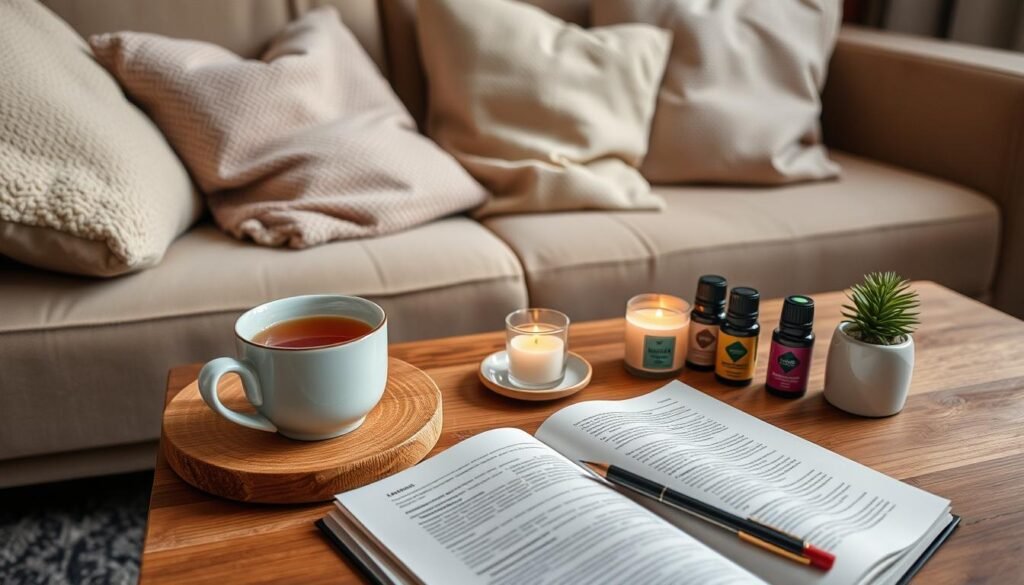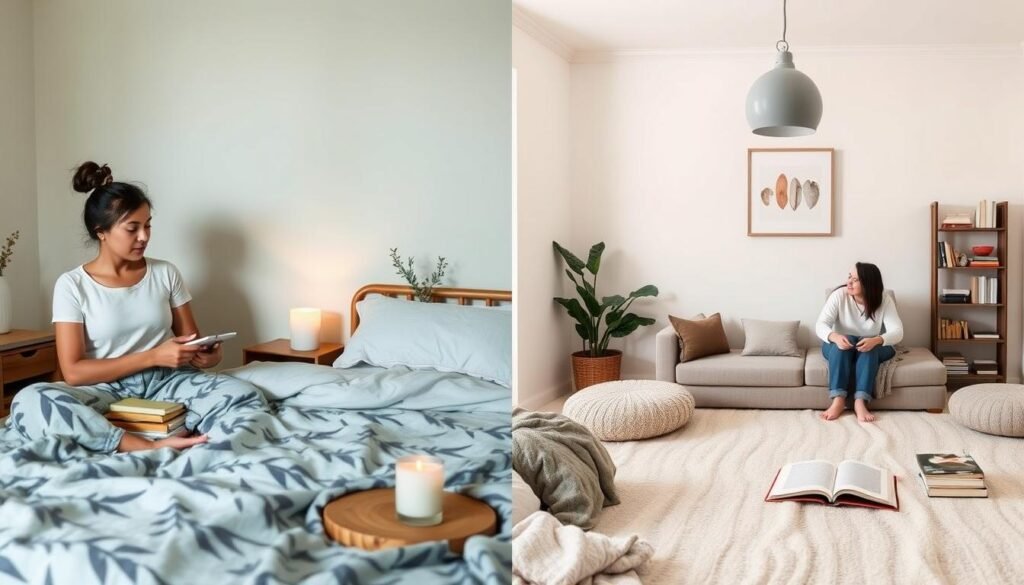Nearly 5% of adults worldwide are battling depression, and many don’t know it. This fact highlights how crucial mental health is in relationships. When you’re a girlfriend dealing with depression, it creates unique challenges. These can stress even the strongest relationships. Fred Rogers once said that love is an active effort. But depression can make you feel disconnected and doubtful. This can affect how you connect with your partner.
Knowing how to be a better girlfriend despite depression is vital. It’s important for both your well-being and the relationship’s health. By recognizing and using effective coping methods, communication can improve. This also brings more empathy into the relationship. With patience and open talks, couples can deal with depression’s challenges together. This makes love a strong, caring force in their lives.
Key Takeaways
- Understanding depression is essential for maintaining healthy relationships.
- Practice self-awareness to recognize signs of depression in yourself.
- Establish open communication with your partner about your feelings.
- Integrate daily coping strategies to manage depressive symptoms.
- Encourage professional help and support from loved ones.
Understanding Depression and Its Impact on Relationships
Depression changes how we understand love. It can make someone pull away, get easily upset, and feel not good enough. These issues can cause problems with their partner. A study with over 20,200 Norwegian couples found those dealing with mental health issues, like depression, had a higher chance of splitting up. This shows why it’s so important to support a partner with depression.
When someone is depressed, negative feelings can take over a relationship. About 83% of women and 63% of men with depression have trouble with sexual intimacy. This makes things harder. Symptoms like being very tired, lacking energy, and not wanting to do things can make someone want to be alone. Their partner might then feel left out or forgotten.
Depression can lead to bad communication, less drive to do things, and not understanding each other’s challenges. People with depression might see themselves and their relationships in a negative way. This is why it’s important to talk about feelings and find ways to spend time together that work for everyone.
Finding help is crucial for relationships hurt by depression. Therapy, including online options like Talkspace and BetterHelp, provides support. Being able to talk openly helps couples face their problems while caring for each other’s feelings.
How to Be a Better Girlfriend When You Have Depression
Being in a relationship while dealing with depression is hard. If you wonder how to improve as a girlfriend despite depression, know this: It’s vital to see how mental health affects your relationship. Depression may make you feel distant and unsure of yourself. This can make it tough to keep a strong connection with your partner.
Here are some steps to build a stronger bond:
- Seek Professional Help: Talking to a therapist gives you ways to handle depression better.
- Practice Open Communication: Be honest about how you feel. It helps your partner understand you more.
- Focus on Self-Love: Loving yourself is hard during tough times, but it’s key to a closer bond.
- Identify Distorted Thoughts: Know when your thoughts might wrongly judge your partner’s actions. Talk about these openly.
- Encourage Moments of Connection: Do things that bring you closer. This supports you both emotionally.
Using these tips helps you grow and makes your relationship better, even when facing depression. Knowing how depression affects emotional ties helps create a caring environment. This is good for both of you.
Recognizing Symptoms of Depression in Yourself
Knowing how to spot signs of depression is key. It shows up in many ways, making people feel alone and unwell. Understanding these signs helps us talk about our feelings better. This makes it easier to keep up our relationships when dealing with depression.
Common Signs of Depression
The symptoms can vary from person to person. Yet, some of the most common ones are:
- Irritability, making it hard to get along with others.
- Fatigue, which makes everyday tasks tough.
- Not wanting to do things that used to be fun.
- Feelings of hopelessness or having no worth.
- Unexplained physical pain.
Acknowledging these symptoms is the first step to feeling better.
The Importance of Self-Awareness
Being aware of our feelings is key in handling depression. It leads to healthy self-care and reflection. Knowing how we feel allows us to talk openly with our loved ones. These talks build empathy and support, helping in the healing process.
Coping Strategies for Depressed Girlfriends
It’s hard to manage depression in a relationship. But, finding good coping strategies for a depressed girlfriend is key. These can keep both your minds healthy and the relationship strong. Together, you’ll find a middle ground between caring for yourselves and each other.
Daily Routines That Help
Having a regular daily routine brings stability and a sense of achievement. Small tasks can really boost mental health. Make sure to:
- Wake up and go to bed at consistent times
- Do short exercises like stretching or walking
- Eat healthy meals regularly
- Set goals that are easy to reach
- Take time to relax, maybe by reading or meditating
Such habits can make you feel better and less anxious. This is key for those supporting a depressed girlfriend.
Acknowledging Moments of Joy and Sadness
It’s important to notice both the happy and sad moments. Keeping a diary helps with this. Writing down daily experiences lets people understand their own emotions. Consider doing the following:
- Note three joyful things each day, even if they’re small.
- Talk about tough times and what caused those feelings.
- Think of ways to handle bad situations better.
These steps build emotional strength. They help you take care of yourself and keep your relationship strong. Understanding your feelings makes you feel closer to those you love.

| Strategy | Description | Potential Benefits |
|---|---|---|
| Structured Routines | Setting up a regular plan for everyday activities. | Brings order and a feeling of success. |
| Mindfulness Journaling | Keeping track of emotions and daily events. | Leads to better emotional insight. |
| Physical Activity | Adding exercise to your day. | Makes you happier and less stressed. |
| Support Systems | Reaching out to friends, family, or support groups. | Gives emotional backing and fights loneliness. |
Using these coping techniques helps both personal and relationship growth. It’s crucial to find a balance between looking after yourselves and each other. This balance is what gets you through the tough times of depression together.
Communicating Needs During Depressive Episodes
Talking about your needs during depression is hard but very important for relationships. To understand depression in love, we need to think deeply and know ourselves well. We must talk about our feelings with care and patience. Let’s look at some good ways to share what we’re going through.
How to Express Yourself to Your Partner
Opening up when times are hard takes bravery. Here are some helpful ways to talk about it:
- Initiating the conversation when things are calm and there are no distractions helps a lot.
- Using “I” statements makes it about your feelings. Say “I feel overwhelmed,” not blaming the other person.
- Being specific about needs makes your emotions clearer. For example, say if you need a quiet night or more support.
Creating a Safe Space for Open Dialogue
For support to work, both people must understand each other well. To talk openly, you should:
- Setting aside regular times for chats makes sure there’s always a chance to share feelings.
- Encouraging honesty lets both people talk about their feelings without fear. This helps a lot in love and depression.
- Listening actively makes the other person feel heard and cared for, which is very important when they’re depressed.
These methods of communication are crucial. Good, honest talks help solve problems now and make the emotional bond stronger.
| Communication Technique | Description | Benefits |
|---|---|---|
| Active Listening | Fully concentrating, understanding, responding, and remembering what is being said. | Enhances trust and emotional safety. |
| Regular Check-ins | Setting specific times to discuss feelings and needs. | Promotes consistent support and understanding. |
| Encouraging Expressions | Allowing partners to express both positive and negative emotions freely. | Validates feelings and encourages openness. |
Maintaining Relationships with Depression
Keeping a relationship strong when dealing with depression takes work from both sides. Spending quality time together is key. It helps build stronger bonds and emotional connection. Picking activities everyone enjoys but that are also laid-back is important.
Prioritizing Quality Time
Spending time together can make a big difference. Doing comforting and familiar activities can boost mood and bring people closer. Cooking or watching a favorite movie together are great ways to make happy memories without too much stress. Looking into WebMD’s relationship tips can offer helpful advice during these tough times.
Finding Comfortable Activities Together
Doing things together helps couples bond and can lighten the load of depression. It’s important to choose activities that feel good for both people. This makes the time together boost spirits instead of adding stress. Going for walks, doing arts and crafts, or reading together can be very soothing. Finding support groups or community activities can also help by providing mutual understanding. These efforts are key in keeping up with relationships through depression and in giving support to a depressed partner.

Supporting Your Partner with Depression
Helping a partner with depression is both challenging and rewarding. Around 19.4 million Americans deal with this condition each year. It’s common in romantic relationships. Knowing the signs of depression is key. These include losing interest in things, sleeping or eating more or less, and feeling guilty.
Creating an empathy-filled environment helps both partners understand depression better. It can improve how you talk and make your relationship stronger. A 2019 study shows that couples therapy helps a lot. It increases happiness in the relationship and provides tools for support.
It’s crucial to look after yourself too when you’re supporting a partner with depression. Caregivers often forget their own needs. Make sure to get enough sleep, eat well, and exercise. Being outside and in nature also helps your mental health.
Remember, your partner’s depression is just one part of them. It doesn’t define who they are. Keeping an open and safe space for talking helps both of you. Be patient and show that you’re there to help them through tough times.
For more tips and information, check out resources on understanding depression in relationship. Learning and applying these tips can make your relationship stronger. It helps you support your partner while taking care of your own well-being.
Balancing Self-Care and Relationships
Finding the right balance between self-care and keeping healthy relationships is key. This is especially true for those dealing with mental health challenges. Personal time is important for reflection and can help one recharge.
By focusing on individual needs while also nurturing connections, partners can better understand each other. This balance is vital for emotional recovery and overall well-being.
The Importance of Personal Time
Setting aside time for oneself is good for mental health and relationships. This space helps in processing emotions. It also aids in finding ways to cope, especially for those feeling down.
Activities like writing in a journal, meditating, or being in nature can improve mood. They also build resilience, making it easier to face challenges.
Encouraging Healthy Habits Together
Partners can create a supportive environment for living healthy. Doing things together like working out, cooking nutritious meals, or mindfulness practices can strengthen the bond. These activities help in balancing the needs of self-care and the relationship.
Introducing rituals that include personal and shared moments keeps the relationship exciting. It helps the emotional bond grow stronger, making both feel supported and valued.

| Activity | Benefits for Self-Care | Relationship Benefits |
|---|---|---|
| Yoga | Reduces stress and anxiety | Enhances teamwork and trust |
| Cooking Healthy Meals | Improves physical health | Encourages collaboration and fun |
| Nature Walks | Boosts mood and clarity | Strengthens emotional connection |
| Reading Together | Encourages relaxation | Promotes shared interests |
| Meditation | Improves focus and mindfulness | Facilitates open communication |
In a supportive setting, personal time and joint activities hold equal value. Couples can work through mental health challenges together. This approach fosters love, understanding, and a dynamic that values both partners’ need for self-care.
Understanding Depression in Romantic Partnerships
Understanding depression in romantic partnerships is crucial. It’s about seeing how this condition impacts the relationship. Often, misunderstandings happen when one partner is going through tough times. Knowing these challenges helps create a supportive atmosphere. This, in turn, leads to healthier dynamics between partners.
How to Recognize Misinterpretations
Sometimes, partners may not understand each other’s actions. They might see withdrawal or irritability as not caring, which creates distance. In the US, 15% to 20% of couples face depression at some point. It’s key to talk openly about feelings and thoughts to avoid these issues.
- Recognize changes in behavior:
- Increased withdrawal or silence may show pain, not indifference.
- Frustration can come from unexpressed feelings, not just conflicts.
- Choose the right moments to communicate:
- Talk meaningfully when both feel calm and secure.
- Don’t discuss difficult topics in stressful times.
Building Empathy and Patience
Empathy and patience are key in strong relationships, especially with a partner facing depression. Offering understanding and support strengthens the bond. With professional help, about 80% of people with depression see improvement. This shows the value of psychological treatment for mental health.
| Supportive Actions | Potential Outcomes |
|---|---|
| Open communication about feelings | Increased trust and reduced isolation |
| Participating in therapy together | Enhanced relationship satisfaction |
| Validation of each other’s experiences | Strengthened emotional connection |
Dealing with depression in relationships means both partners need to understand each other. It can be easier to talk to strangers than loved ones, affecting closeness. Empathy is key to healing. It leads to better dynamics and stronger bonds. Through patience and support, a relationship based on understanding and kindness is built.
Creating Healthy Dynamics as a Girlfriend
Building healthy girlfriend dynamics is key, especially when facing depression. It improves a romantic relationship’s quality. Emotional intelligence is crucial in this. It helps us be more aware of our feelings and those of our partner.
By being emotionally intelligent, we can grow closer. We show kindness and stay committed. This strengthens our bond.
To better support each other, keep communication open about feelings. This helps both understand each other’s emotional needs. It makes the relationship nurturing.
Checking on how we feel can give insights. It shows how the relationship is doing.
Humor and laughter are important. They help fix relationship problems and build stronger connections. They help us handle change and grow.
Making these changes might require asking what needs to be different. This can lead to positive results.
A balanced relationship is essential for growth. It supports personal goals and happiness. Facing mistakes together helps improve the relationship.
This allows for fresh starts and growth through change.
Supporting your partner while taking care of yourself is important. Recognizing emotional distress can help manage mental health issues better. A supportive partnership lets both thrive, even with depression.
For more tips on dealing with emotional challenges, click here.
Conclusion
Learning to be a better girlfriend when you have depression is about growing compassion and talking openly. It’s vital for people to know they’re not facing this alone. Strong relationships can overcome difficulties, as seen in friendships and romantic bonds that got stronger.
To help a partner with depression, do small, helpful things every day. Listen well and watch their body language to connect better and build trust. These actions help both of you deal with insecurities and mental health struggles more effectively.
Deepening your bond means working on mental health together. Treat your relationship as a team effort. This creates a safe and loving environment. Both partners feeling important and understood is key. It’s the ongoing work and shared moments that make your connection stronger, allowing you to face challenges as one.